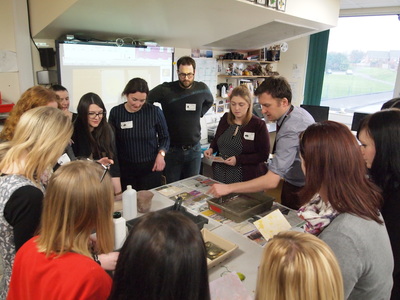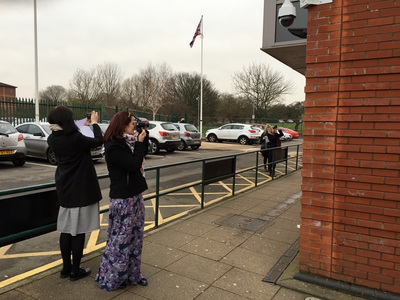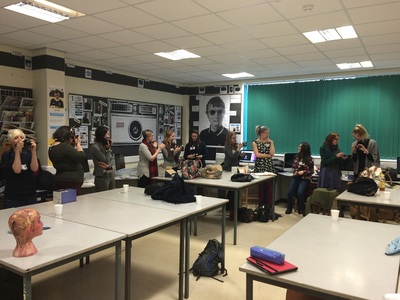Training the next generation of photography teachers
Experiences delivering workshops to MMU PGCE students.
By Jon Kime
In recent years there has been an increase in the number of school art departments offering some form of digital photography as an option for their students to pursue, whether as part of an existing art and design course or as a stand alone GCSE in itself. I know from experience that in the beginning, gathering information, seeking advice and getting a course started can be a daunting task and that is before the teaching begins. As someone with a keen interest and competence in photography, the plunge into teaching it as a subject was an exciting and inspiring journey to begin but for some it can be quite the opposite experience. I was lucky, I took control of the course and with support of our leadership was able to offer the GCSE when I thought that the time was right and to those students whom I thought would benefit the most. Others are not so lucky, some are told to offer a course in photography or may start a new job in a department that already offers it. Not all of these colleagues have the knowledge or indeed confidence with this medium and are daunted by the prospect.
Our school has strong links with the Manchester Metropolitan University PGCE programme, myself and colleagues with in the department having qualified through the programme ourselves. Part of their course includes a one day workshop where the trainees visit a school to learn how to deliver digital media. As with the technology, this workshop is continually evolving and for the last three years has been delivered by myself focusing on digital photography in the classroom. The workshop takes place in January between trainees block A and block B placements, many have experienced teaching photography as part of their initial teaching and observing as part of block A but many have worries and concerns at the thought of taking sole control of a photography class as part of block B and in the future in their first job.
During the sessions I cover a range of topics and techniques starting with an outline of how I structure and deliver my own units of work and guide pupils through presentation in digital sketchbooks. The highlight of the day is inevitably the practical sessions where I like to treat the trainees as I would a brand new group of Y10 pupils who are just about to embark on the GCSE. Through experiencing the course content first hand trainees are able to get a real feeling for both their own skills and knowledge of the subject and highlight areas in which they may choose to develop before teaching for themselves. We cover topics such as setting up the camera for the first time, holding the camera and taking a photo through to analysing and responding creatively to an image. A session follows where trainees create digital sketchbook samples and explore ways in which coursework can be presented for assessment and moderation. We round off the day with a session on planing photography lessons for the various situations that the trainees may find themselves in next year such as schools with very little resources through to those that are abundant.
Confidence is key in the delivery of all subjects but perhaps more so in one in which you are not primarily trained or that relies on the use of often unfamiliar technology. The challenge facing our new colleagues is to get up to speed with both curriculum content at a new place of work and also the skills needed to deliver to a group of learners. In my experience, trainees are crying out for opportunities of CPD in areas such as photography and digital art. Universities are making progress in offering these sessions, but with such a lot to cover in a PGCE year, time is limited. Feedback from my latest session suggests that the areas that were touched on were valuable in both confidence building and and understanding of the subject. Students have spoken of the desire to learn more about the subject and in more depth and have emphasised the value of guided lesson planning time with experienced colleagues, something that I plan to offer perhaps during their enrichment phase of the course.
It is clear that as the popularity of digital photography within secondary schools continues to grow and art departments are encouraged to offer some form of it weather at GCSE or KS3, it is our duty as practicing professionals to offer continued support to those colleagues in need of it in any way. I have seen a positive movement in recent years with the emergence of sites such as Photopedagoy and the Through the Lens Facebook group as great examples of places teachers can reach out to and be confident of finding the support and encouragement that they need from colleagues with a wide range of expertise.
Our school has strong links with the Manchester Metropolitan University PGCE programme, myself and colleagues with in the department having qualified through the programme ourselves. Part of their course includes a one day workshop where the trainees visit a school to learn how to deliver digital media. As with the technology, this workshop is continually evolving and for the last three years has been delivered by myself focusing on digital photography in the classroom. The workshop takes place in January between trainees block A and block B placements, many have experienced teaching photography as part of their initial teaching and observing as part of block A but many have worries and concerns at the thought of taking sole control of a photography class as part of block B and in the future in their first job.
During the sessions I cover a range of topics and techniques starting with an outline of how I structure and deliver my own units of work and guide pupils through presentation in digital sketchbooks. The highlight of the day is inevitably the practical sessions where I like to treat the trainees as I would a brand new group of Y10 pupils who are just about to embark on the GCSE. Through experiencing the course content first hand trainees are able to get a real feeling for both their own skills and knowledge of the subject and highlight areas in which they may choose to develop before teaching for themselves. We cover topics such as setting up the camera for the first time, holding the camera and taking a photo through to analysing and responding creatively to an image. A session follows where trainees create digital sketchbook samples and explore ways in which coursework can be presented for assessment and moderation. We round off the day with a session on planing photography lessons for the various situations that the trainees may find themselves in next year such as schools with very little resources through to those that are abundant.
Confidence is key in the delivery of all subjects but perhaps more so in one in which you are not primarily trained or that relies on the use of often unfamiliar technology. The challenge facing our new colleagues is to get up to speed with both curriculum content at a new place of work and also the skills needed to deliver to a group of learners. In my experience, trainees are crying out for opportunities of CPD in areas such as photography and digital art. Universities are making progress in offering these sessions, but with such a lot to cover in a PGCE year, time is limited. Feedback from my latest session suggests that the areas that were touched on were valuable in both confidence building and and understanding of the subject. Students have spoken of the desire to learn more about the subject and in more depth and have emphasised the value of guided lesson planning time with experienced colleagues, something that I plan to offer perhaps during their enrichment phase of the course.
It is clear that as the popularity of digital photography within secondary schools continues to grow and art departments are encouraged to offer some form of it weather at GCSE or KS3, it is our duty as practicing professionals to offer continued support to those colleagues in need of it in any way. I have seen a positive movement in recent years with the emergence of sites such as Photopedagoy and the Through the Lens Facebook group as great examples of places teachers can reach out to and be confident of finding the support and encouragement that they need from colleagues with a wide range of expertise.



